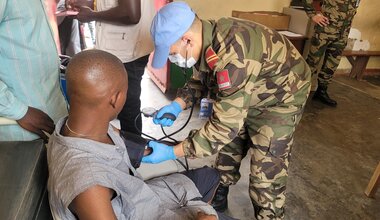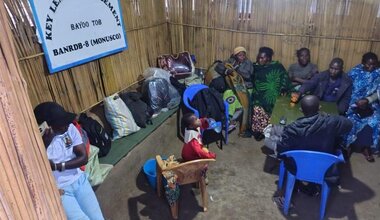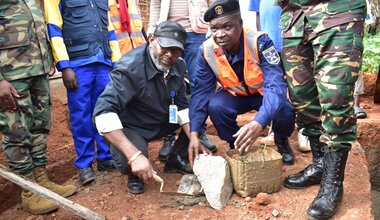Abdoul Aziz Thioye: "the report on the violence in Djugu is not directed against a community"
Bunia, 15 January 2020 - The Director of the United Nations Joint Human Rights Office, Abdoul Aziz Thioye, paid a brief visit to Bunia in Ituri on Tuesday, 14 January 2020, to meet with local authorities and the population after the release, 4 days earlier, in Geneva, Switzerland, by the Office of the United Nations High Commissioner for Human Rights, of the report on inter-ethnic violence in the Djugu Territory.
During this violence, which took place between "December 2017 and September 2019, 701 people have been killed, 168 injured and 142 people have been subjected to acts of sexual violence, in the context of inter-ethnic tensions between the Lendu and Hema communities", notes the report.
From the outset, Abdoul Aziz Thioye made it clear that "this report is not directed against a specific community. Criminal responsibility is not collective but rather individual. It is not a community that is stigmatized, but individuals, who belong to a community, and who are guilty of atrocities and acts of barbarism that may amount to crimes against humanity," he told members of the press, whom he met at the MONUSCO Conference Hall in Bunia.
Criminal responsibility is not collective but rather individual.
Responding to criticism that the report does not satisfy either community, or that it appears to have underestimated the extent of the violence, the Director of the UN Joint Human Rights Office in the DRC said that it was primarily a human rights report and not a judicial inquiry.
He added: "We are in a position to provide evidence of everything we say in this report. The toll of these atrocities may be higher, as some might say, but we have only reported what we have been able to document".
Justice, Development, Stabilization and Reconciliation
A lot of blood has been shed in Djugu Territory. Therefore, for the United Nations, in addition to the necessary justice, efforts must now also be directed towards development, stabilization and community reconciliation.
That is why MONUSCO is providing support to the efforts of the provincial and national authorities to bring peace to Djugu and to Ituri in general, so that peace can be established in the hearts and among the communities.
In that sense, under the auspices of the provincial Government of Ituri, in 2019 alone, MONUSCO facilitated the organization of six community dialogues in Djugu Territory (Fataki, Nizi, Drodro, Lita, etc.), including the various communities, and subsequently, a broad awareness-raising campaign within the Lendu community.
These activities enabled the communities to maintain communication between them and to mitigate the extent of violence in this Territory. Another example of the impact of these dialogues is that the participants were able to identify the causes of the violence and agreed on possible solutions to restore stability to their Territory.
The report on the violence in Djugu makes other recommendations in favor of peaceful conflict resolution, awareness-raising campaigns, community reconciliation to promote "living together", demobilization, transitional justice, etc. The report also calls on the DRC authorities to address the root causes of the conflict and to identify the main perpetrators of the violence in Ituri so they can brought to justice.
This is also one of the objectives of this report which, for the Director of the UN Joint Human Rights Office, is an advocacy tool. So, “no one will be able to claim they didn't know," he concluded.
 UN
UN United Nations Peacekeeping
United Nations Peacekeeping






